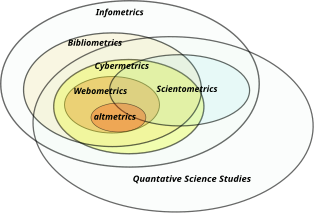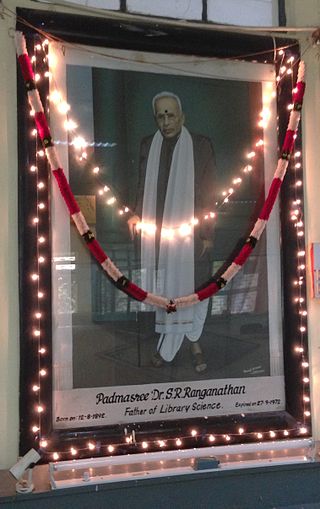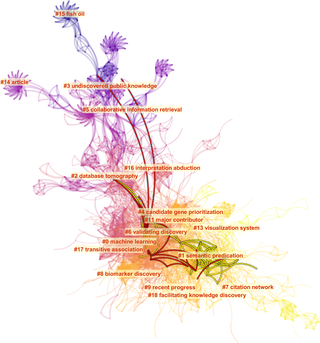The Award of Merit is bestowed by the Association for Information Science and Technology. [1] It is an annual prize to an individual for a lifetime of achievement that recognizes sustained contributions to and/or achievements in the field of information science and/or the professions in which it is practiced. The Award of Merit was first given in 1964 to Hans Peter Luhn.





| Name | Date | Major accomplishments |
|---|---|---|
| Andrew Dillon | 2023 | Understanding Users: Designing Experience through Layers of Meaning. [2] |
| Harry Bruce | 2022 | Dean, University of Washington Information School |
| Steve Sawyer | 2021 | Editor-in-Chief, Journal of the Association for Information Science and Technology . |
| Diane H. Sonnenwald | 2020 | Theory Development in the Information Sciences. [3] |
| Christine Borgman | 2019 | Big Data, Little Data, No Data: Scholarship in the Networked World [4] |
| Toni Carbo | 2018 | Executive Director, National Commission on Libraries and Information Science (NCLIS) |
| Thomas D. Wilson | 2017 | "Fifty Years of Information Behaviour Research." [5] |
| Peter Ingwersen | 2016 | The Turn - Integration of Information Seeking and Retrieval in Context. [6] |
| Michael E.D. Koenig | 2015 | Knowledge Management (Km) Processes in Organizations: Theoretical Foundations and Practice. [7] |
| Marjorie M.K. Hlava | 2014 | President, Access Innovations. [8] |
| Carol C. Kuhlthau | 2013 | Guided Inquiry : Learning in the 21st Century. [9] |
| Michael Buckland | 2012 | Information and Society. [10] |
| Gary Marchionini | 2011 | Information Concepts: From Books to Cyberspace Identities. [11] |
| Linda C. Smith | 2010 | Library and Information Science, Interdisciplinary Perspectives: A Festschrift in Honor of Linda C. Smith. [12] |
| Carol Tenopir | 2009 | Communication Patterns of Engineers. [13] |
| Clifford Lynch | 2008 | Director of the Coalition for Networked Information. |
| Donald H. Kraft | 2007 | Operations Research for Libraries and Information Agencies; [14] editor Journal of the Association for Information Science and Technology for 24 years. |
| Blaise Cronin | 2006 | Dean of the School of Library and Information Science, Indiana University. |
| Marcia Bates | 2005 | Encyclopedia of Library and Information Sciences [15] |
| Howard D. White | 2004 | “Combining Bibliometrics Information Retrieval and Relevance Theory." [16] |
| Nicholas J. Belkin | 2003 | Interaction in Information Systems: A Review of Research from Document Retrieval to Knowledge-Based Systems. [17] |
| Karen Spärck Jones | 2002 | "A Statistical Interpretation of Term Specificity and Its Application in Retrieval." [18] |
| Patrick G. Wilson | 2001 | Two Kinds of Power; an Essay on Bibliographical Control. [19] |
| Donald R. Swanson | 2000 | Swanson Linking; Dean of the University of Chicago Graduate Library School. |
| José-Marie Griffiths | 1999 | V.P., board directors, King Research, Inc. |
| Henry Small | 1998 | Institute for Scientific Information; Bibliometrics of Basic Research. [20] "Macrolevel changes in the structure of co-citation clusters." [21] |
| Dagobert Soergel | 1997 | Best Information Science Book of the Year-1987-Organizing Information: Principles of Data Base and Retrieval Systems. [22] |
| Jean Tague-Sutcliffe | 1996 | Measuring Information: An Information Services Perspective. [23] |
| Tefko Saracevic | 1995 | “A Study of Information Seeking and Retrieving. III. Searchers Searches and Overlap.” [24] Editor-in Chief Information Processing & Management (1985-2008). |
| Harold Borko | 1994 | "Artificial intelligence and expert systems research and their possible impact on information." [25] American Society for Information Science, president 1966. |
| Robert M. Hayes | 1993 | Handbook of Data Processing for Libraries. [26] |
| Robert Saxton Taylor | 1992 | The Making of a Library; the Academic Library in Transition. [27] “Value-Added Processes in the Information Life Cycle.” [28] |
| Roger K. Summit | 1991 | Founder of Dialog Information Services, "father of modern online searching." |
| Pauline Atherton Cochrane | 1990 | Papers in Honor of Pauline Atherton Cochrane. [29] One of the most highly cited authors in the field of library and information sciences. [30] |
| Gerard Salton | 1989 | Dynamic Information and Library Processing. [31] ACM Fellow. [32] |
| F. Wilfrid Lancaster | 1988 | Toward Paperless Information Systems.; [33] Most cited in 1970s- 1990s. [34] |
| Donald W. King | 1987 | President of ASIS; Key Papers in the Economics of Information. [35] |
| Bernard M. Fry | 1986 | Founding editor, Government Publications Review;Festschrift; [36] Government Publications: Their Role in the National Program for Library and Information Services. [37] |
| Robert L. Chartrand | 1985 | "Computer Technology and the Congress." [38] |
| Joseph Becker and Martha E. Williams | 1984 | Becker, “Communications Networks for Libraries.” [39] and Williams,“Education and Training for Online Use of Data Bases.” [40] |
| Dale B.Baker | 1983 | Director of Chemical Abstracts. [41] |
| Andrew A. Aines | 1982 | Director of COSATI [42] |
| Herbert S. White | 1981 | Festschrift in Honour of Herbert S. White [43] |
| Claire Kelly Schultz | 1980 | President of the American Documentation Institute, 1962."Claire Kelly Schultz (1924-2015)." [44] |
| Frederick Kilgour | 1979 | President of OCLC; Legion of Merit for intelligence work during World War II, “History of Library Computerization.” [45] ,American Library Association Honorary Membership. |
| Calvin Mooers | 1978 | Coined the term "information retrieval." "A Pioneer Of Information Retrieval." [46] |
| Allen Kent | 1977 | Best Information Science Book of the Year- 1979-The Structure and Governance of Library Networks.; [47] Encyclopedia of Library and Information Science. [48] |
| Laurence Heilprin | 1976 | "Laurence B. Heilprin, 1906-1993. [49] |
| Eugene Garfield | 1975 | Founder of bibliometrics and scientometrics and Science Citation Index; A Festschrift in Honor of Eugene Garfield. [50] |
| Manfred Kochen | 1974 | Founding Editor of Human Systems Management. [51] |
| Jesse Shera | 1973 | Documentation and the organization of knowledge; American Library Association Honorary Membership [52] Papers in honor of Jesse Hauk Shera. [53] |
| Phyllis Richmond | 1972 | ‘‘Hierarchical Definition;’’ [54] "The Art and Science of Classification: Phyllis Allen Richmond, 1921–1997." [55] |
| Jerrold Orne | 1971 | Chaired Z39 Committee, precursor to National Information Standards Organization, Director University of North Carolina at Chapel Hill libraries and professor of Library Science at the University of North Carolina at Chapel Hill. [56] [57] |
| Cyril W. Cleverdon | 1970 | Cranfield Experiments; "Cyril W. Cleverdon." [58] |
| No Award | 1969 | |
| Carlos Cuadra | 1968 | Best Information Science Book Award-1969- for Annual Review of Information Science and Technology; “Role of the Private Sector in the Development and Improvement of Library and Information Services." [59] |
| Robert Fairthorne | 1967 | "Robert Fairthorne and the Scope of Information Science." [60] “Robert A. Fairthorne, a Biographical Sketch.” [61] |
| Mortimer Taube | 1966 | “Theoretical Principles of Information Organization in Librarianship.” [62] "On the Shoulder of Giants." [63] |
| Charles P. Bourne | 1965 | “Cost Analysis and Simulation Procedures for the Evaluation of Large Information Systems.” [64] |
| Hans Peter Luhn | 1964 | Luhn algorithm; H.P. Luhn: Pioneer of Information Science. [65] |
References
- ↑ "Award of Merit General". Association for Information Science and Technology.
- ↑ Andrew Dillon to Receive the Association for Information Science and Technology 2023 Award of Merit Association for Information Science and Technology, 2023.
- ↑ Sonnenwald, Diane H. (2016). Theory Development in the Information Sciences. 2016 First ed. Austin: University of Texas Press.
- ↑ Borgman, Christine.(2015). Big Data Little Data No Data: Scholarship in the Networked World. Cambridge Massachusetts: MIT Press.
- ↑ Wilson, T. D. (2010). "Fifty Years of Information Behaviour Research." Bulletin of the American Society for Information Science and Technology. 36 (3): 27–34.
- ↑ Peter Ingwersen, Kalervo Järvelin. (2005). The Turn - Integration of Information Seeking and Retrieval in Context. The Kluwer International Series on Information Retrieval 18, Kluwer 2005
- ↑ McInerney Claire R and Michael E. D Koenig. 2011. Knowledge Management (Km) Processes in Organizations : Theoretical Foundations and Practice. Cham Switzerland: Springer.
- ↑ Access Innovations. https://www.accessinn.com/leadership/
- ↑ Kuhlthau, Carolyn C. (2015) Guided Inquiry : Learning in the 21st Century. 2015 Second ed. Santa Barbara CA: Libraries Unlimited.
- ↑ Buckland, Michael. (2017),Information and Society. 2017. Cambridge Massachusetts: MIT Press.
- ↑ Marchionini, G. (2010). Information concepts: From books to cyberspace identities. Morgan and Claypool Publishers.
- ↑ Anita S. Coleman and Martha Kyrillidou, editors.Library and Information Science, Interdisciplinary Perspectives: A Festschrift in Honor of Linda C. Smith. (2022), Library Trends 71 (August).
- ↑ Carol Tenopir and Donald W. King. Communication Patterns of Engineers. New York: IEEE Press, Wiley Interscience, 2004.
- ↑ Kraft Donald H and Bert R Boyce. 1991. Operations Research for Libraries and Information Agencies: Techniques for the Evaluation of Management Decision Alternatives. San Diego: Academic Press.
- ↑ Bates, Marcia J.; Maack, Mary Niles, Eds. (2010). Encyclopedia of Library and Information Sciences, 3rd Ed. New York: CRC Press.
- ↑ White Howard D. (2007). “Combining Bibliometrics Information Retrieval and Relevance Theory Part 1: First Examples of a Synthesis.” Journal of the American Society for Information Science and Technology: 536–59;White Howard D. 2007. “Combining Bibliometrics Information Retrieval and Relevance Theory Part 2: Some Implications for Information Science.” Journal of the American Society for Information Science and Technology 583–605.
- ↑ Belkin Nicholas J and A Vickery. 1985. Interaction in Information Systems: A Review of Research from Document Retrieval to Knowledge-Based Systems. London: British Library.
- ↑ Spärck Jones, K. (1972). "A Statistical Interpretation of Term Specificity and Its Application in Retrieval". Journal of Documentation. 28: 11–21.
- ↑ Wilson Patrick. 1968. Two Kinds of Power; an Essay on Bibliographical Control. Berkeley: University of California Press.
- ↑ Small, Henry and Institute for Scientific Information. 1990. Bibliometrics of Basic Research. Springfield Va: National Technical Information Service.
- ↑ Small, Henry. (1993). Macrolevel changes in the structure of co-citation clusters: 1983–1989. Scientometrics. 26. 5-20.
- ↑ Soergel Dagobert. 1985. Organizing Information : Principles of Data Base and Retrieval Systems. Orlando Fla: Academic Press.
- ↑ Tague-Sutcliffe Jean. 1995. Measuring Information : An Information Services Perspective. San Diego: Academic Press.
- ↑ Saracevic Tefko and Paul Kantor. 1988. “A Study of Information Seeking and Retrieving. III. Searchers Searches and Overlap.” Journal of the American Society for Information Science 197–216.
- ↑ Borko, H., "Artificial intelligence and expert systems research and their possible impact on information." Education for Information, 3(2) 103-14, 1985.
- ↑ Hayes Robert Mayo and Joseph Becker. 1970. Handbook of Data Processing for Libraries. New York: Becker & Hayes.
- ↑ Taylor Robert S. 1972. The Making of a Library; the Academic Library in Transition. New York: Becker and Hayes.
- ↑ Taylor Robert S. 1982. “Value-Added Processes in the Information Life Cycle.” Journal of the American Society for Information Science 341–46.
- ↑ Wheeler William J and Pauline A Cochrane. 2000. Saving the Time of the Library User through Subject Access Innovation : Papers in Honor of Pauline Atherton Cochrane. Champaign IL: Publications Office Graduate School of Library and Information Science.
- ↑ Barre, Kathryn La (2010-05-01). "Pauline Atherton Cochrane: Weaving Value from the Past". Libraries & the Cultural Record. 45 (2): 210–237. doi:10.1353/lac.0.0120. ISSN 2166-3033. S2CID 201769200.
- ↑ Salton Gerard. 1975. Dynamic Information and Library Processing. Englewood Cliffs N.J: Prentice-Hall.
- ↑ "Gerard Salton ACM Fellows 1995". acm.org. Retrieved 10 March 2015.
contributions over 30 years to information organization and retrieval
- ↑ Lancaster, F. W. (1978). Toward Paperless Information Systems. New York: Academic Press.
- ↑ Qin Jian. 2008. "F. W. Lancaster: A Bibliometric Analysis." Library Trends 56 (4): 954–67.
- ↑ King, Donald W., Nancy K. Roderer, Harold A. Olsen and American Society for Information Science. (1983). Key Papers in the Economics of Information. White Plains N.Y: American Society for Information Science, Knowledge Industry Publications.
- ↑ “Bernard M. Fry Festschrift; a Special Issue.” 1986. Government Publications Review 13 (January): 1–145.
- ↑ Government Publications: Their Role in the National Program for Library and Information Services. (1979). Washington: Government printing Office.
- ↑ Chartrand, Robert L.1970. “Computer Technology and the Congress.” Information Storage & Retrieval 6 (June): 229–40
- ↑ Becker, Joseph. (1966). “Communications Networks for Libraries.” Wilson Library Bulletin 41 (December): 383–87
- ↑ Smith, Linda C., and Carol Tenopir. 2010. “Martha E. Williams: Pioneer Information Scientist and Online Industry Guru.” Libraries & the Cultural Record 45 (2): 185–209.
- ↑ Baker, Dale B. director of the Chemical Abstracts Service, American Chemical Society, (1974). “Baker Became President-Elect of the American Society for Information Science.” Wilson Library Bulletin 48 (January): 374.
- ↑ Penniman, W. David. "Remembering “Andy” Aines: A Look Back at His Call for a National STI Policy." Information Services & Use, 41, no. 1-2, (1 Jan. 2021): 185 – 189.
- ↑ International Essen Symposium. Herbert S White. Ed. by A. H Helal and J. W Weiss and Universitätsbibliothek Essen. 1993. Opportunity 2000--Understanding and Serving Users in an Electronic Library : 15th International Essen Symposium 12–15 October 1992 to Commemorate the 20th Anniversary of the Essen University Library: Festschrift in Honour of Herbert S. White. Essen: Universitätsbibliothek Essen.
- ↑ Williams, Robin V. (2015). "In Memoriam: Claire Kelly Schultz (1924-2015)" (PDF). Bulletin of the Association for Information Science and Technology. 41 (6). asist.org: 8–11. doi:10.1002/bult.2015.1720410606. Archived from the original (PDF) on 2016-03-04. Retrieved 2015-11-07.
- ↑ Frederick G. Kilgour. “History of Library Computerization.” Information technology and libraries 3.3 (1970): 218–229.
- ↑ Garfield, Eungene. (1997). "A Tribute to Calvin N. Mooers, A Pioneer Of Information Retrieval." The Scientist:11, #6, p.9, March 17, 1997.
- ↑ Kent, Allen and Thomas J Galvin. 1979. The Structure and Governance of Library Networks. New York: Marcel Dekker.
- ↑ Kent, Allen; Harold Lancour' William Z Nasri' and Jay Elwood Daily. 1968-2003. Encyclopedia of Library and Information Science. New York: M. Dekker.
- ↑ "Roderer, Nancy and Anthony Debons and Donald Kraft. 1993. "Laurence B. Heilprin, 1906-1993." Journal of the American Society for Information Science 44 (10) (Dec 01): 555-556.
- ↑ Garfield, Eugene, Blaise Cronin, and Helen Barsky Atkins. The Web of Knowledge: A Festschrift in Honor of Eugene Garfield. Medford, N.J.: Information Today, 2000.
- ↑ Zeleny, Milan. “Manfred Kochen (1928–1989).” Human systems management 8.2 (1989): 95–96.
- ↑ Shera, Jesse.Documentation and the organization of knowledge. Hamden, Conn., Archon Books, 1966
- ↑ Rawski, C. H. (1973). Toward a theory of librarianship: Papers in honor of Jesse Hauk Shera. Metuchen, N.J: Scarecrow Press.
- ↑ Phyllis A. Richmond, ‘‘Hierarchical Definition,’’ American Documentation 11 (1960), 91–96.
- ↑ La Barre, Kathryn A. "The Art and Science of Classification: Phyllis Allen Richmond, 1921–1997." (2004). Library Trends, Vol. 52, No. 4, Spring 2004, pp. 765–791.
- ↑ Poole, Herbert. 1977. Academic Libraries by the Year 2000 : Essays Honoring Jerrold Orne. New York: R.R. Bowker.“Jerrold Orne: A Biographical Sketch.”
- ↑ Du Mont, Rosemary Ruhig. 1982. “Jerrold Orne: A Biographical Sketch.” Journal of Academic Librarianship 8 (March): 20–25.
- ↑ Stephen Robertson,"Cyril W. Cleverdon In Memoriam." Journal of the American Society for Information Science 49(10):866
- ↑ Cuadra, Carlos A. 1980, “Role of the Private Sector in the Development and Improvement of Library and Information Services [Paper Presented at the 1979 Chicago Graduate Library School Conference).” Library Quarterly 50 (January): 94–111.
- ↑ Brookes, B.C. (1974), "Robert Fairthorne and the Scope of Information Science.", Journal of Documentation, 30 No. 2, pp. 139-152.
- ↑ Schultz, Wallace L., C. K. Schultz, and W. L. Schultz. 1971. “Robert A. Fairthorne, a Biographical Sketch.” Journal of the American Society for Information Science 22 (May): 161–65.
- ↑ Taube, Mortimer. “Theoretical Principles of Information Organization in Librarianship.” Library Quarterly 34 (July): 352–61;
- ↑ Elizabeth S. Smith (1993). "On the Shoulder of Giants: from Boole to Shannon to Taube: the Origins of Computerized Information from the Mid-19th Century to the Present". Information Technology and Libraries.
- ↑ Bourne, Charles P. and D. F. Ford. 1964. “Cost Analysis and Simulation Procedures for the Evaluation of Large Information Systems.” American Documentation 16 (April): 142–49.
- ↑ Claire K Schultz. 1968. H.P. Luhn: Pioneer of Information Science. New York: Spartan Books.







